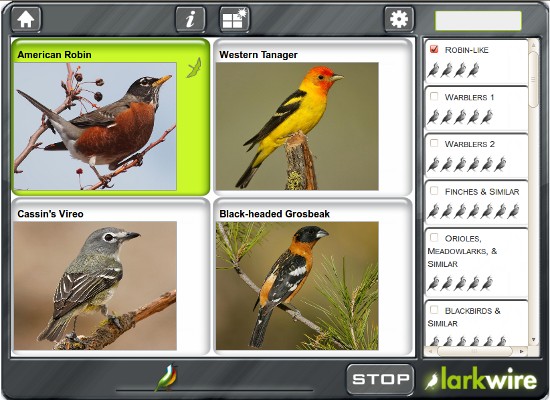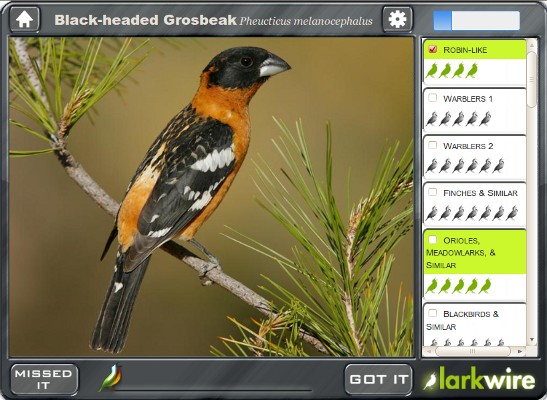Here are nine tips that will help you make better use of Larkwire. Although we tried to build Larkwire so that it "just works like magic," you'll get more out of it if you know how to use it well.
Bird sounds contain subtle qualities and dimensions that may be obscured with cheap earbuds or junky computer speakers. You don't need to spend a lot on it, but good quality sound can really help.
Everyone starts off in the Gallery Game and later the system automatically switches to the Field Game. Usually this works fine and is what you want. But there are situations where you may want to control the game type.
The Gallery is for learning to hear the differences between songs and the Field is for practising recall. So if you're in a Field Game and you keep confusing certain sounds, switch back to Gallery (via the Settings page).
The Field game is essential, not just because it forces you to recall names, but because it allows you to gradually merge more and more groups. The wider the context, the more like real birding. To really develop field skills, use the Field Game with increasing numbers of groups together.


Larkwire gives you structured practice. But sometimes you just need to explore the sounds. Maybe you're in a Gallery Game and one sound keeps tripping you up. You can open up the Comparison page for your group and access all the samples for all the species in the group. (The cuts that are actually in your game will be shown at a larger size; the other cuts give additional sound variations and are used at higher game levels.) Playing all four Vesper Sparrow cuts in a row might be just what you need to hear how Vesper differs from Song Sparrow.

In a Gallery, you can press the Info button and show the tips. Or, you can bring up the Comparison page and view all the tips together. Michael O'Brien's text is extraordinarily helpful—if you know how to use it. There's a lot to say about this and we have a separate article about it.
You're working on the trillers and have got them all except two—you keep confusing Dark-eyed Junco and Orange-crowned Warbler. Open the Comparison page for trillers and check the checkboxes for those two species. Now you can have a Gallery game (or a Field game) for just that comparison. Much more efficient! You can do this for any number of species and they don't even have to be in the same group.
If you get stuck on a group, sometimes the best strategy is to work on something else for a while. A different group will stretch your ears in a different way. When you return to the first group, there's a good chance you'll notice things that you didn't before.
Learning is consolidated when we sleep. Oftentimes you will have new insights and fresh perceptions when you come back and try another day.
Weightlifters sometimes say that one careful, mindful "rep" (repetition) is worth ten where you're just going through the motions. The same is true for training your ears. Take your time, enjoy the sounds, and listen with full attention.
When you first start playing, you may think the goal is to get everything right. It's not. When learning bird sounds, you're constantly making and testing hypotheses. Finding out you were wrong is part of learning! The real goal is to refine your listening skills, in ways that can't be fully explained but can only be experienced. This takes a lot of listening and plenty of mistakes. Have fun and enjoy these incredible sounds!
When you're up to speed on the basics, check out our article on Advanced Listening Skills, too.